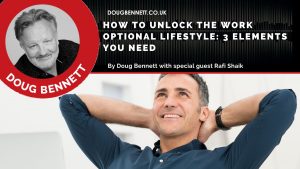How To Build A Retirement Lifestyle And Set Your Business Up For Success

By Doug Bennett with special guest Aaron Stahl
Have you ever thought about taking a mini-retirement and simply going off the grid?
Many entrepreneurs want to remain at the helm of their business affairs for as long as possible, probably because they fear the business will collapse without them. However, one way to keep your business gears turning is to let go of the steering wheel once in a while.
When I think about mini-retirements, Aaron Stahl, Founder and Chairman of P3 Cost Analysts, comes to mind. Although he got the idea from a Tim Ferriss book, it’s since shaped his company culture, turbocharged his business, and freed-up time for some incredible adventures (including learning how to fly a plane!).
You can hear our full conversation on the Goals Do Come True podcast.
I was keen to find out more about mini-retirements and how entrepreneurs can apply this concept to keep their businesses running smoothly.
How mini-retirements work
Aaron: “I got the idea from Tim Ferriss’ book, ‘The 4-Hour Workweek’, where he advocated for these mini-retirements, and that was one of the things in the book that resonated with me the most. The idea is that instead of waiting until you’re of pension age (probably in your 60s), you take a few months off every once in a while. Completely cut off work and go do something that you enjoy or something that’s on your bucket list.”
I love the idea of hitting the pause button and just taking some time off to attend to our personal wellbeing. However, there’s one simple question every entrepreneur needs to answer: could you take some time off without running out of money or without your business coming to a grinding halt?
In the past, I’ve written about the work-optional lifestyle (click here to read it) and why it’s worth laying down the right foundations so you can afford to stop working – even if it’s only for a short while.
It was refreshing to hear that Aaron’s journey to mini-retirements also began with getting his finances right.
Building a retirement lifestyle
Aaron: “The idea of taking mini-retirements was probably the first big, hairy, audacious goal that I had. I didn’t have any money or a business that made any money, and I hadn’t taken a vacation in three years. So, the first goal was really to get my income up to the point where I could take some time off to travel and do the things that I enjoyed.
The ultimate goal was to get ten local clients and then have a mini-sabbatical every five years. As it turns out, it’s been every six years. I didn’t quite hit the five-year mark. But I’ve done three mini-retirements, travelled around the world, learned how to fly, and pursued my passions of golf and surfing. It’s just been really important to have that time on the horizon.”
As a business owner, I agree with Aaron’s statement about the importance of having some time on the horizon to cater to your personal passions and whims. But as he points out, you should also extend that freedom to the people who work for you.
Integrating mini-retirements into your company culture
Aaron: “This year, we decided to roll out the same opportunity to our employees, and that’s probably one of the things that I’m most proud of. It’s a pretty fun perk to hand out – the gift of time and the ability to pursue things you’re passionate about.”
I’ve also done something similar. Recently, I offered my small team an additional two weeks off during the summer holidays to enable them to spend more time with their kids and make the most of the short sunny days (can’t trust the British weather!).
While it certainly costs money to offer these paid breaks, it’s incredibly beneficial to them and to the business in the long run. When you or anybody else steps out of their role in the company for an extended period, it really offers some perspective on what’s working and what’s not. It also allows other team members to step in and make bigger decisions, therefore expanding their scope of knowledge.
Aaron sums this up quite brilliantly.
Building systems for a mini-retirement
Aaron: “Tim Ferris makes a really good point in his book about the benefits of taking time off. As a solopreneur with one to 20 employees, if you leave for a week, you’re going to come back to a mountain of work. Nothing’s broken. If you leave for two weeks, you’ll probably come back to a mountain of work and a few broken things.
But if you leave for three weeks, you’ll most likely come back to see that your employees have fixed a lot of those problems on their own, and they feel more empowered and trusted. You’ll also get a fresh perspective on certain things, such as who steps up, who needs to be in a different role, and so on.”
From what Aaron has shared, it’s clear that taking time off from work – whether it’s for a few weeks or longer – can yield incredible results for your business.
It’s also important to note that the results you’ll get mostly hinge on having great people on your team. So, take the leap, hire the right people, create a system that works even without you, and make sure you’re giving back to your team by offering them the same opportunity.
Do you have any plans for a mini-retirement coming up soon? Or maybe you’d rather wait until you’ve built the right systems and processes?
I’d love to hear about it! Drop me a line at doug@dougbennett.co.uk. And if you’d love an accountability group with free access to a weekly dose of inspiration, join The Wealth Tribe today.




